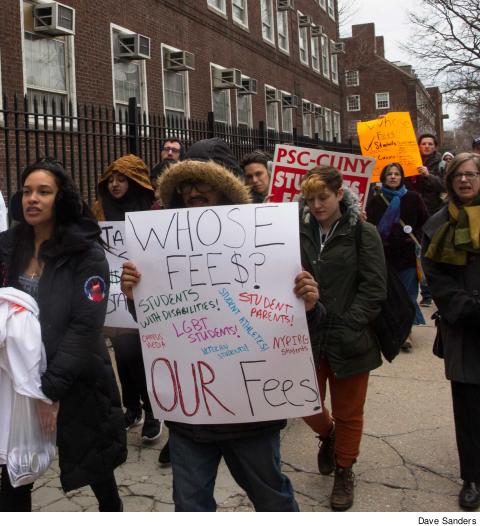Protests against board
 |
CUNY Board of Trustees members are expected to vote in March to reform the student activity fee process. What they might not have expected was a movement of students from around the university organizing to stop them from doing so.
On March 12, as this newspaper was going to press, the board was met with student and faculty outrage at the Brooklyn borough hearing. Protesters said the board offered an undemocratic proposal that would limit students’ ability to determine how their fees will be used. Protests were expected to continue at the full board meeting on March 19.
CENTRALIZING CONTROL
Under a court order, the board organized a task force last October to centralize control of allocation of the student activity fees used to fund student organizations and programs. Student activity fees vary depending on the campus and status of the student enrollee. Yet these fees are treasured by student leaders to fund on-campus events and organizations.
As a fact sheet from the CUNY Coalition for Student Rights explains, “Proposed changes include severe restrictions on referenda, the process by which the entire student body can vote to institute a new campus service or program. Referenda have been used to jump-start service organizations, day care centers, health-care clinics, entire media boards and new sports teams, among other projects.”
It continued, “Additionally, the board is considering removing community service as an acceptable use of the student activity fee….We can vote to increase or decrease our student activity fee, but they won’t let us decide where it goes.”
STUDENT NEEDS
Activists have said this limits how students can allocate their funds.
“All of us have individual stories as to why we need the student activity fee, why we need athletics, why we need money for study abroad,” Yssed David Tobo, president of York College’s Student Government Association, said during a demonstration against the changes at the February board meeting.
Many feared that the board’s proposed change could lead to the defunding of the New York Public Interest Research Group.
During the February meeting, Loretta Martinez, general counsel and vice chancellor of legal affairs, noted that a task force was set up last October to redesign the student activity fee on all CUNY campuses. She compared the student activity fee to a rundown car that needed major changes, which elicited groans from students.
“When you start looking at the student activity fee infrastructure, it is complicated,” she said.
PSC BACKS STUDENTS
One student on the task force, Kawthar Abdullah, a student senator from Borough of Manhattan Community College, criticized officials for suggesting the plan and urged a no vote.
“When we were presented with the proposed changes, we ambitiously disagreed and were told by the legal counsel not to inform our constituents,” she said.
The PSC has vocally protested the board’s proposal on grounds that, as PSC President Barbara Bowen put it in a letter to the trustees, “student groups report that they have not been appropriately engaged in the potential redesign of student fees.”
“Students’ right to engage in free speech and participate in self-governance – to decide upon, participate in and organize the activities of their choosing – is a fundamental right that should not be abridged,” Bowen said.
A BAD FIX
“In a sense, CUNY is trying to pull the veil over the eyes of students and make decisions about funding without input from those who matter the most,” said an op-ed in the Campus, the City College student newspaper. “[B]y working behind closed doors, hiding the truth from students and avoiding town halls or campus visits, the university is attempting to seize control of student activities and student fees, determining where funding goes on a ‘one-size-fits-all’ scale.”
It continued, “Unfortunately, we know that one-size-fits-all is more like one-size-fits-none. Each campus in the CUNY system runs differently. Yet, they all share a profound underfunding and maintain a home to some of the most resource-starved students in the state. Without any public conversation, CUNY’s Board of Trustees proposed the removal of referenda voting, an essential part of students’ self-determination where they can bring specific issues of funding to the general campus population to a vote.”

